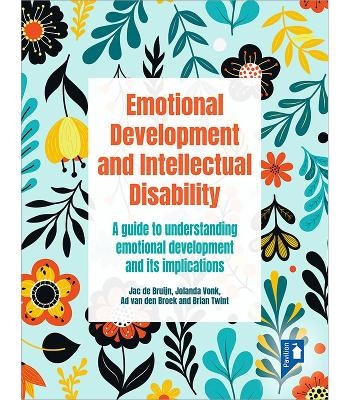
Emotional Development and Intellectual Disability
Pavilion Publishing and Media Ltd (Verlag)
978-1-914010-58-3 (ISBN)
This important book recognises the complexity and importance of emotions and emotional development in the needs and lives of people with intellectual disabilities (learning disabilities), and in their care and support. Combining research, assessment and practice, and bringing together a team of experts and advisers in the field, enables exploration of this complex topic from a number of positive perspectives, including emotional development as an adaptive behaviour, as a support need, and as a quality of life domain. With insights into the intertwined connection between the emotions and the brain, the book systematically sets out theoretical frameworks, themes of emotional development, diagnostics and support, before considering whether it is possible to provide an integrative model as a basis for theory, everyday practice and research. It is a book that is relevant to everyone working in the field of intellectual disability as a key reference for practice, education, policy-making and research.
Jac de Bruijn is an independent consultant for healthcare and society (www.youcare.site) with more than 30 years of experience in healthcare, especially for people with a disability. He is a former member of the Board of Directors of Stichting Prisma and was previously head of treatment and mental health psychologist. He worked as a lecturer at the Erasmus Medical Center, to which he is now affiliated as a guest lecturer. He published several books together with others and is specialised in methods and interventions for people with intellectual disability. He is passionate about inclusion, inclusive research and ethics of care. Jolanda Vonk studied educational science at the Free University of Amsterdam (VU, cum laude). She works as a senior behavioral scientist at ORO/Lore in the Netherlands. She is working in the field of people with ID for more than 30 years as a healthcare psychologist, remedial educationalist, sexologist, supervisor and coach. Jolanda also works as a consultant for the Centre of Expertise and Consultation (CCE), a national organization in the Netherlands that is deployed on demand for complex problems of people with intellectual disability or mental health problems. She provides training to post-graduate education and to organizations in company about emotional development, sexology and social interaction in the professional relationship since ten years. Jolanda has written several publications on emotional development. She is also a member of the Network of Europeans on Emotional Development (NEED, 2015) which, as a Special Interest Group (SIG), is part of the EAMHID. Ad van den Broek worked as a healthcare psychologist in the care of people with intellectual disabilities. Today he works at FORTIOR, which he founded in 2006 and for which he is now responsible together with Catja van den Broek. His interest is mainly in the emotional and personality development in the context of the developmental dynamic model and in methods in the field of relationship, contact. communication and support. Brian Twint studied social work at the Amsterdam University of Applied Sciences and after a period in youth services has been working for years as a personal supervisor and project leader in the field of intellectual disability. Twint is the original designer of the 'Affectief Bewuste Benadering' (Affective Conscious Approach), initiator of the Expertise Centre Intellectual Disability in the Netherlands, and author of several books about and for people with intellectual disabilities.
Preface
Editorial
Introduction
Part I Theoretical frameworks
1.Emotional development and intellectual disability: introduction to a dynamic concept
2.Neurobiological aspects of emotional development
3.Seven stages of emotional development, from birth to adulthood
4.Emotional development, stress and adaptation
5.The relationship between cognition and emotion in people with an intellectual disability: a neurocognitive approach
Part II Themes of emotional development
6.Development of emotion regulation and the role of the attachment relationship
7.Emotional Development in Autism Spectrum Disorders
8.Sexual and emotional development in people with intellectual disabilities
9.Emotional development and mental health disorders
10.The systematic and family approach in relation to emotional development and intellectual disability
Part III Diagnostics and support
11.Emotional development and assessment in persons with an intellectual disability
12.The Scale of Emotional Development - Short
13.Scale for Emotional Development for people with intellectual disabilities (SED-R2) and translation into (treatment and) support
14.The SED-R(2) Colour Profile
15.What works?! Cross-fertilisation between forensic psychiatry and care for people with mild intellectual disabilities
16.Emotional development and methodical support for people with intellectual disabilities
17.The importance of social relationships for persons with an intellectual disability: emotion regulation and how ICT can support parents and caregiver
18.Working with a disorganised attached child: Individual child psychotherapy embedded within a mentalising network.
19.The wire between client and caregiver. A metaphor on emotional and social development
Part IV Review
20.Epilogue: a constructive description of emotional development
21.Closure statements Advisory Board
| Erscheinungsdatum | 06.09.2021 |
|---|---|
| Sprache | englisch |
| Maße | 189 x 246 mm |
| Themenwelt | Geisteswissenschaften ► Psychologie ► Klinische Psychologie |
| Medizin / Pharmazie ► Medizinische Fachgebiete ► Psychiatrie / Psychotherapie | |
| ISBN-10 | 1-914010-58-2 / 1914010582 |
| ISBN-13 | 978-1-914010-58-3 / 9781914010583 |
| Zustand | Neuware |
| Haben Sie eine Frage zum Produkt? |
aus dem Bereich


